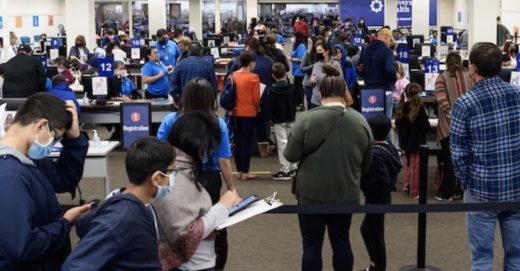The first two cases of the COVID-19 omicron variant have been detected in Bexar County through genome testing conducted by UT Health San Antonio, according to San Antonio Metro Health.
The newest variant was reported to the World Health Organization on Nov. 24, initially detected in specimens collected in South Africa.
On Nov. 26, the U.S. government designated omicron as a variant of concern because of it being easier to spread than the original COVID-19 virus or delta variant, Centers for Disease Control and Prevention officials said.
To date, 30 states and the District of Columbia have reported cases of the omicron variant, according to the CDC. The World Health Organization said that as of Dec. 9, omicron cases had been confirmed in 63 countries.
The first death related to complications from the omicron variant was reported by British Prime Minister Boris Johnson on Dec. 13.
“Metro Health has been monitoring this situation the past few weeks as it has been unfolding around the globe, so we expected to see cases in Bexar County eventually,” Metro Health Director Claude Jacob said in a statement. “Vaccination continues to be the best defense and protection against COVID-19. We recommend that individuals who are not vaccinated do so as soon as possible to help protect themselves from the omicron variant.”
The city of San Antonio’s COVID-19 dashboard showed 203 people were hospitalized locally with coronavirus as of Dec. 10 with 78 of those patients in an intensive care unit and 40 patients on ventilators.
Dr. Bryan Alsip, executive vice president and chief medical officer for University Health, said UH hospitals continue to care for patients who are ill with COVID-19, including those admitted to the hospital for serious disease.
“As we continue to learn more from the rapidly evolving situation around the omicron variant, it is important to remember that vaccination and practices that limit potential exposure are still the best way for people to protect themselves and others from any COVID-19 variant,” he added.
Metro Health officials said in a release that early reports still indicate that the omicron variant causes milder symptoms and that vaccination provides extra protection against severe illness, hospitalization, and death.
Full vaccination and a booster are recommended for everyone who is eligible, especially before any holiday gatherings, Metro Health officials added.
About 1 in 3 San Antonians is not fully vaccinated, according to Metro Health. Those wanting to be vaccinated or in need of a booster dose may visit the Alamodome drive-thru clinic from noon to 8 p.m. Wednesday-Friday or a Metro Health vaccine pop-up clinic. For a list of pop-up clinics, visit www.covid19.sanantonio.gov or call 311 and select option 8.
University Health offers free Moderna and Pfizer COVID-19 vaccinations at the COVID-19 Vaccination Center at Wonderland of the Americas, 4522 Fredericksburg Road, and at several pharmacy locations throughout the city. Visit University Health’s vaccine page wecandoitsa.com for details.
Metro Health recommends that all individuals wear a mask, regardless of vaccination status, when indoors with many people outside of their household. Persons not feeling well and showing symptoms should stay home and get a COVID-19 test, Metro Health officials suggested.
Additionally, Metro Health encourages 16- and 17-year-olds to get a Pfizer vaccine booster shot at least six months after completing their first two COVID-19 doses, following the CDC’s recommendations.
Individuals may get a Pfizer vaccine booster at the Alamodome drive-thru clinic, University Health’s Wonderland Mall clinic or a Metro Health vaccine pop-up clinic.
“We know that COVID-19 vaccines are safe and effective, so we encourage older teenagers, ages 16 and 17, to get their booster ahead of the holidays and to be protected from serious illness or hospitalization,” Jacob said.





